
views
Keeping Your Cat Stimulated
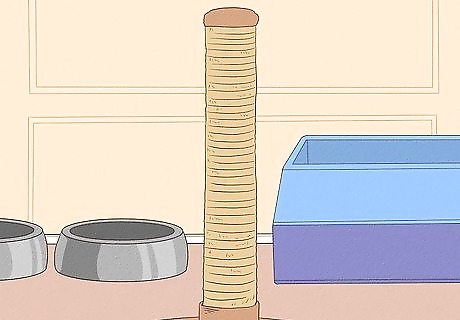
Prepare your home for the cat. Buy a scratching post, litter box, food, water bowls and a cat bed before bringing your cat home. Make sure to put the litter box in a quiet, low-traffic area--such as a pantry, a guest bathroom, or any secluded nook--where the cat can do its business in private. Buy a large cat carrier, as the Siberian cat can get quite large. It's okay if the carrier seems too large at first; the cat will grow into it. When you bring the cat home, put the carrier in a room, open the door of the cat carrier, and close the door of the room. Leave the cat to explore the room on its own terms. Siberian cats are very good with families and other types of animals, so it's okay if you have other pets at home.
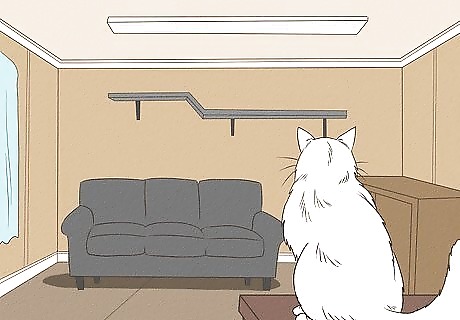
Give the cat room to explore. Siberian cats have high energy levels, and they enjoy roaming around. Most prefer having access to the outdoors. If kept indoors, they should have at least a large apartment to explore. Indoor cats are at risk of obesity due to lower activity levels, so watch their food intake carefully. Outdoor cats are at higher risk of injury and disease--so be careful letting them roam in areas where they may encounter heavy vehicle traffic, wild animals, or pesticides and other chemicals. Siberians are strong jumpers, and they enjoy exploring high places. They are agile cats, and they don't tend to break things, but you may consider keeping precious or expensive items out of reach.
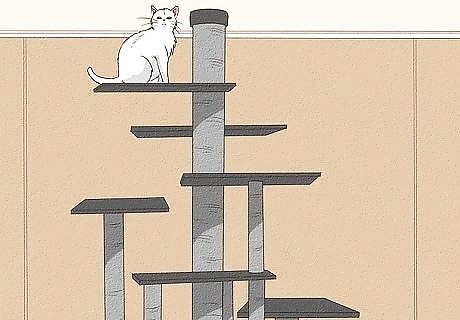
Provide entertainment. Siberian cats are intelligent, and they need stimulation. Bored Siberian cats may overeat or scratch up the furniture, among other things. Here are a few ways to prevent boredom: Buy a ceiling-high "tree" where the cat can jump up to survey his territory. Give the cat toys and feline puzzle games. Experiment with yarn, toy mice, lasers pointers, and catnip. Many Siberian cats enjoy playing fetch. Encourage him with treats or kibble as a reward. A second cat will usually make the first one less lonely, especially if they are litter mates. Make sure the cats are neutered or spayed, unless you want to deal with kittens; this is especially important if you have a male and a female cat together, but outdoor cats may also encounter opposite-sexed cats around your neighborhood.
Keeping Your Cat Healthy
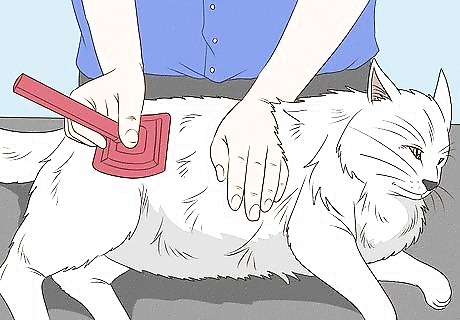
Groom the cat's fur. Even though Siberian cats have thick coats, grooming is easier than with most longer-haired cats. Siberian coats don't tend to mat or tangle too quickly, so grooming once or twice a week is enough to keep it healthy. Brush gently with a slick, soft brush or with a metal comb, depending on the preference of the cat. Siberians molt twice a year, shedding fur in large clumps. During these times, daily brushing is the easiest way to keep the coat from matting and tangling. Brushing reduces the likelihood of hairballs. It's also very important to make sure your cat gets enough fibers, through food or through a malt paste. Siberian cats are the only long-haired cat considered hypoallergenic.
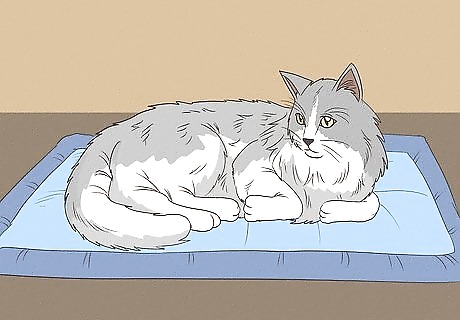
Protect the cat from heat. Siberia has one of the world's greatest temperature variations with average winter temperatures around -20°C, and summer temperatures frequently reaching 30°C and even +38 °C in some parts. Siberian cats are well adapted to these temperature changes; they will drop their thick, heavy coats in Spring leaving a shorter coat with much less undercoat. They regrow their thick coats and fabulous ruff around their neck in the autumn so they can keep warm in winter. Consider taking the following precautions during summer months to help them where possible: Put ice in the cat's food or water. At the very least, use cold water instead of warm or room-temperature water. Make sure to watch if your cat will still drink water with ice cubes in it. In the end, what's important in cooling down is that your cat drinks a lot of water, not how cold that water truly is. Some people will take the cat to a professional groomer and have her shave away most of the fur. The fur will grow back by the winter, but it may make your cat much more comfortable through the summer months. Nevertheless, most people won't recommend shaving the cat as the fur coat also functions as an isolating layer to keep out the heat, as well as it keeps out the cold. Also, their temperature goes down by licking themselves and letting the saliva evaporate. If you truly want to shave your cat either way, consider just shaving the belly. Like that the cat can cool down by laying down on a colder surface as the floor or a cold/wet towel, while still keeping the isolation properties of the rest of the coat. Keep in mind that cats can also get sunburnt, so if you decide to shave your cat, make sure to use cat friendly sunscreen at all times. Visit a veterinarian if your cat seems uncomfortable. You may notice it going to great lengths to keep cool, such as rubbing against the refrigerator or spending time in cold spaces. If the cat makes painful yowling noises, and it doesn't seem particularly hungry, it might be uncomfortable. Cats sweat and cool down through their paws. There are special cooling blankets made for cats and dogs, some you have to wet before using them. These blankets stay cold for quite a while and are very useful in providing a cool spot for the cat to lay upon, or simply putting the paws on it for a bit.
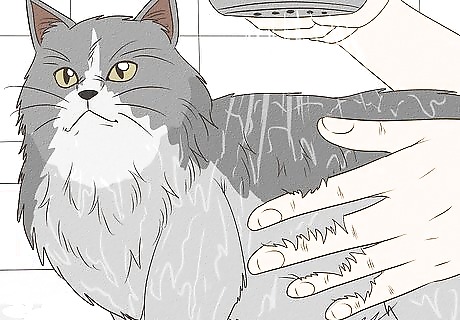
Bathe the cat only if truly necessary. Cats are extremely hygienic animals and are the best when it comes to their personal hygiene, unless they're too fat or in pain due to for example arthritis. Siberian cats have a water-resistant, triple-layered coat. Many of them enjoy water and may try to jump into the bath or shower. Even if your cat doesn't like water, bathe him if the coat gets dirty and the cat can't clean themselves. Bathing once or twice a year can also reduce allergens, if someone in the house is allergic to cats. If necessary, use a mild, conditioning, oatmeal-based cat shampoo. Your Siberian cat has a somewhat oily coat that keeps the skin healthy and manages the cat's temperature. Bathing too frequently can strip away these protective oils. Because of the thick coat, it can take up to 45 minutes to fully soak the cat's fur.
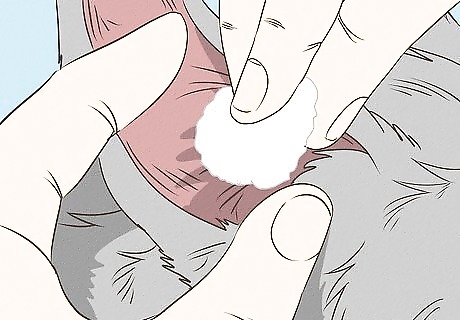
Check the cat's health weekly. If you have a kitten, start these care habits early so your kitten gets use to it. If you have any trouble with these procedures, ask a veterinarian to show you how to do them: Trim nails once a week or as needed. Use nail trimmer scissors. Check the cat's ears about once a week. If they look dirty, cleanse using a cotton ball dampened with vet-recommended, mild cat ear cleanser. If the ears are red or have a bad smell, take the cat to a veterinarian. Brush your cat's teeth regularly with vet-approved animal toothpaste for overall good health and fresh breath. Siberian cats can quite easily get ticks or fleas. Check outdoor cats regularly, and remove ticks and fleas if you find them.
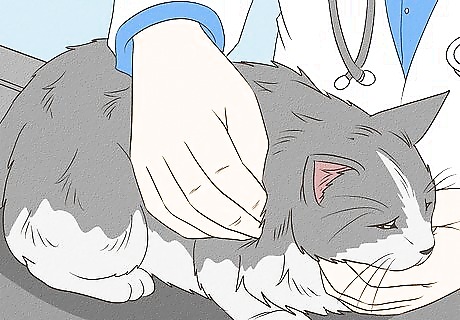
Schedule regular vet checkups. Siberian cats have a chance of getting stomach issues such as IBS or Lymphoma. Make regular vet visits to keep an eye on their stomachs. Siberians are also susceptible to at least one hereditary health issue: hypertrophic cardiomyopathy. Siberians that will be bred should be screened for HCM, and cats identified with HCM should be removed from breeding programs. Do not buy a kitten whose parents have not been tested for this disease.

Feed high-quality cat food. Foods can actually cause higher or lower allergen levels. A high-quality food can prevent many health issues in the cat as well. Feed vet-recommended amounts only, taking into account treat consumption as well. Keeping a Siberian at an appropriate weight is one of the easiest ways to protect his overall health. If your cat becomes overweight, you may need to put him or her on a diet.















Comments
0 comment